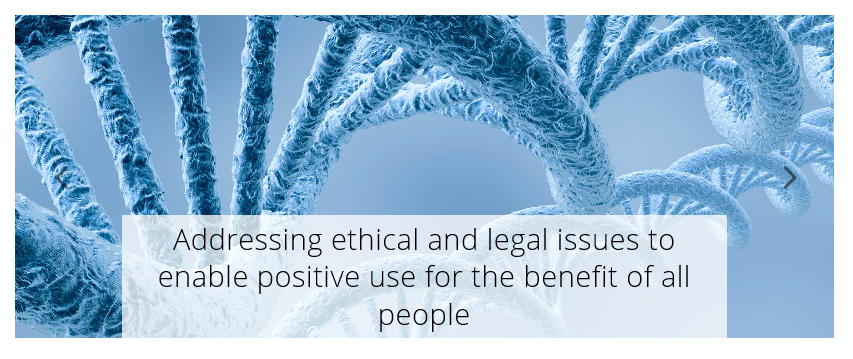Institute of Law and Ethics (ILE)
ILE brings together Lawyers, Scientists and Policymakers to work on interdisciplinary matters affecting justice.
ILE also provides professional training, consultation, reports and expert opinions in issues related to legal and ethical implications of genetics; decision making in a legal context; and other justice related matters.
The Institute collaborates with international partners, including in the UK, USA, China and Canada.
Areas of Research
Background:
A key current focus for the Institute is its interdisciplinary work on Legal and Ethical Implications of Genetics.
Scientific and other advancements, often have profound implications for people’s fundamental rights. Genetic science is an example of a complex science which is advancing at fastest pace in the history of sciences. The increasing amount of information we can now extract from an individual’s genetic data makes urgent the need for updated legal protection/regulation. Interdisciplinary efforts in genetics and law are essential to protect peoples’ rights and ensure fair use of genetic findings.
Key initiatives:
Working Group on Legal, Ethical and Societal Implications of Genetics (LESIG)
LESIG was established in collaboration with The Accessible Genetics Consortium (TAGC) and InLab, Goldsmiths, University of London. More information about LESIG is available on the website of TAGC, of which ILE is a member.
LIG – Legal Implications of Genetics study
LIG is an anonymous questionnaire, developed by LESIG, providing a platform for lawyers (advocates, judges and legal academics) to contribute their knowledge and expertise to the pressing issue of regulating use of genetic findings.
iGLAS – The International Genetic Literacy and Attitudes Survey
iGLAS is developed in collaboration with Goldsmiths, University of London, UK and Tomsk State University, Russia. To learn more and complete the survey please click here.
The Accessible Genetics Consortium – TAGC

TAGC’s goal is to communicate genetic knowledge in an accessible way and to address ethical and legal implications of genetics – to enable everyone to benefit from genetic discoveries.
For more information about TAGC visit tagc.world
Publications:
- Selita, F., & Kovas, Y. (2018). Genes and Gini: What inequality means for heritability. Journal of Biosocial Science, 1-30. doi:10.1017/S0021932017000645
Available on open access here.
- Chapman, R., Likhanov, M., Selita, F. et al. (2018). New literacy challenge for the twenty-first century: genetic knowledge is poor even among well educated. Journal of Community Genetics. https://doi.org/10.1007/s12687-018-0363-7
Available on open access here.
- Karelin D.V., Matsepuro D. M., Selita F (2018). Criminal legal protection of genetic data of the person. Tomsk State University Journal of Law. DOI: 10.17223/22253513/29/7
Available on open access here.
- F. Selita. Genes and Human Rights. Legal Issues Journal 7 (1) 2019, pages 53-95.
Available on open access here.
Institute of Law and Ethics Council:
-
Olga Ivanovna Andreeva – Head of the Unit for Criminal Law, Prosecutor's Supervision and Law Enforcement at Tomsk State University
-
Elena Sergeevna Boltanova – Head of the Unit for Civil Law at Tomsk State University
-
Yulia Kovas – Professor of Genetics and Psychology, Director of International Laboratory for Interdisciplinary Investigations into Individual Differences in Learning (InLab); Department of Psychology, Goldsmiths, University of London; Codirector of the International Centre for Research in Human Development (ICRHD) at TSU; Director of MSc programme «Human Development: Genetics, Neuroscience and Psychology» at Tomsk State University
-
Anthony Metzer QC – Barrister of England and Wales; Head of Chambers, Goldsmith Chambers, London
-
Fatos Selita – Barrister of England and Wales; Attorney and Counselor at Law of the State of New York; Director of AIR Courses at Goldsmiths, University of London; Lecturer on MSc «Human Development: Genetics, Neuroscience and Psychology» at Tomsk State University
-
Tatiana Vladimirovna Trubnikova – Associate Professor, Unit for Criminal Law, Prosecutor's Supervision and Law Enforcement at Tomsk State University
-
Oleg Viktorovich Voronin – Accociate Professor, Unit for Criminal Law, Prosecutor's Supervision and Law Enforcement at Tomsk State University
-
Marc Willers QC – Barrister of England and Wales; Head of Chambers, Garden Court Chambers, London
Partners
The Institute collaborates with international partners, including in the UK, USA, China and Canada.Centre of Excellence
International Centre for Research in Human DevelopmentQS subject
- Philosophy
- Education
- Law

